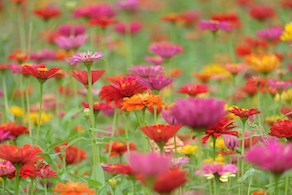Farmers and fishermen in celebratory mood
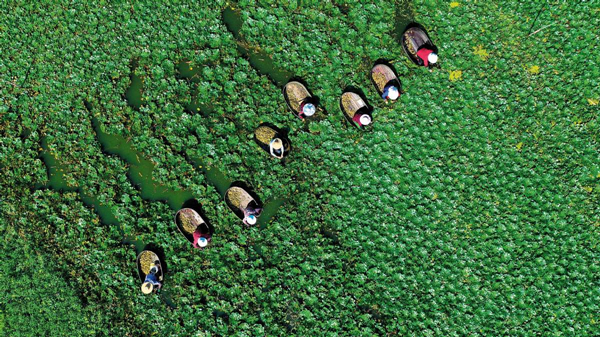
Farmers pick water chestnuts in Huzhou, Zhejiang province, on Thursday, the fourth Chinese Farmers' Harvest Festival. WANG ZHENG/FOR CHINA DAILY
Range of events held nationwide to mark harvest festival
On the morning of Sept 16, Li Zhilong was busy adjusting equipment and preparing his fishing boat in Xiangshan county, Zhejiang province.
The fisherman was celebrating the end of a four-month moratorium on fishing and the launch of a series of activities in the province as part of the fourth national Farmers' Harvest Festival.
Li, 51, updated devices on his vessel-one of about 2,000 boats moored in a local harbor-and couldn't wait to set sail.
"Although fishing at sea is hard, we fishermen are fed by the sea and our work is getting easier as the equipment we use becomes more advanced," Li said.
A traditional folk ceremony to worship the sea was held near the harbor as hundreds of people spilled wine on the ground to pray for calm conditions, a safe journey for the fishermen and a good catch. This year, local characteristics were featured in the costumes worn by fishermen during the ceremony.
A range of events was also organized nationwide especially for farmers and rural affairs workers to celebrate the harvest festival.
The Ministry of Agriculture and Rural Affairs said the main events on Thursday were held along the Yangtze River, where farming in China began and which is a pilot area for green development.
Vice-Minister for Agriculture and Rural Affairs Ma Youxiang said events were hosted by Jiaxing in Zhejiang, Changsha, Hunan province, and Deyang, Sichuan province.
Jiaxing, where the first National Congress of the Communist Party of China was held 100 years ago, organized eight activities, including a digital village exhibition, an agricultural produce market and a folk art performance.
Farmers brought 100 seed varieties 25 kilometers from the Party's birthplace-a boat on Nanhu Lake-to the main site for the ceremony and placed them in a wall to mark the achievements of the seed industry.
The use of agricultural machinery was demonstrated on farmland, along with digital agriculture, such as a factory where seeds and vegetables are cultivated, and a digital ranch. Forecasts of insect infestations were also explained.
Performances of local folk art attracted crowds to the festival, showcasing traditional culture along the Yangtze.
Tang Dongshou, deputy director of the Zhejiang Department of Agriculture and Rural Affairs, said the history of the Party's struggle over the past century marks a development process in which it has led hundreds of millions of peasants in promoting progress in rural areas.
"Hosting the Farmers' Harvest Festival can boost the confidence of farmers and other agricultural workers and provide strength to help rural vitalization," Tang said.
"The festival also promotes interaction between traditional culture and modern civilization," he added.
The nation's top 10 farmers were announced on Thursday in Jiaxing. They included Wang Ying, founder of an agricultural produce brand in Chaoyang city, Liaoning province.
Hunan, home to the nation's largest rice planting area, is an important food production base and has made great achievements in hybrid rice breeding.
During the festival, the province is organizing a forum on food security and will hold rice harvesting and machinery operation competitions.
This year, Hunan has invested 1.74 billion yuan ($269,000) on grain production, including 745 million yuan to buy agricultural machinery.
Statue ceremony
During the first festival in 2018, Mao Zefu, chairman of a cooperative in Shaoshan, Hunan, and more than 200 representatives from major farming cooperatives in the province gathered at the bronze statue of Chairman Mao Zedong in the city, bringing rice, fruit, vegetables, chickens and other agricultural produce to celebrate the harvest.
An exhibition of more than 300 agricultural products was held at this festival. Sales exceeded 600,000 yuan in three days, according to Hunan Daily.
Tang Yuanli, a farmer from Liuyang city, Hunan, said the festival was popular. "Business opportunities could be found during the event," he said, adding that the township head personally sold local specialties.
Many merchants outside the area contacted farmers and bought local produce through livestreaming.
In one village in Fenghuang county, Hunan, 30 livestream broadcasters have sold produce such as kiwi fruits over the past year, raising their annual total income to 4 million yuan.
Farming show
Sichuan, a province with many ethnic groups, is rich in various forms of national culture. On Thursday, a show highlighting the farming culture of the Tibetan, Miao and Yi people through song and dance depicted harvest time on the upper reaches of the Yangtze.
Ding Zhen, who works for a travel company in Garze Tibetan autonomous prefecture, Sichuan, and who has gone viral on the internet for his good looks and personality, performed ethnic songs at the festival.
A stage play featuring the origins of farming 4,500 years ago on the Chengdu Plain was inspired by carbonized rice seeds discovered at the Sanxingdui Ruins in Guanghan, Sichuan, in March.
Archaeologists spoke of the ancient Shu culture via video link to the main site for the ceremony. They said the discovery of the seeds proved that peasants in the area started to plant rice thousands of years ago.
Huang Bangli, a 40-year-old resident of Chaoyang village, Guanghan city, Sichuan, was happy to see his idol Li Ziqi at the festival.
A livestreaming star, Li has nearly 28 million followers and promotes traditional Chinese lifestyles on overseas social media platforms.
For example, she gives advice on planting beans, harvesting them, grinding them into powder and fermenting this to make bean sauce.
"I feel close to Li Ziqi and happy to have seen her because she is also from the countryside and introduces China's farming culture online to the outside world," Huang said.
With a family of three, Huang is pleased to have finished harvesting 6.7 hectares of rice. He also recently planted vegetables such as radishes on 4 hectares of land.
Farmers in Guanghan sang in fields and on country roads. Four generations of farmers told how they had witnessed agricultural development over the past 40 years under the leadership of the Party.
Moreover, 100 talented women in villages across Sichuan were announced at the festival, including craftswomen, a chef, homestay owners and grassroots officials.
Hu Xiuqin, vice-chairman of the provincial women's federation, said their stories will be highlighted to encourage more women in rural areas to get jobs or start businesses and contribute to rural vitalization.
This year, the Farmers' Harvest Festival gala was held for the first time outside a studio at a museum located between the mountains and bay in Shantou, Guangdong province.
Using virtual reality and drones, the gala featured farmers' celebrations nationwide, as well as various agricultural produce and aspects of rural life.
Breeding experts, rural entrepreneurs and Olympic champions also took part in the gala and shared their views on the countryside.

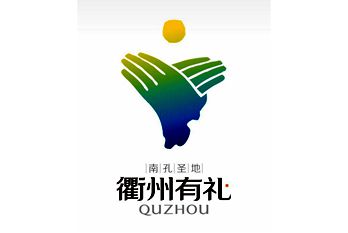 City brand logo - fist-and-palm salute
City brand logo - fist-and-palm salute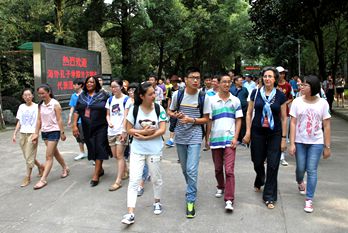 Confucianism on campus
Confucianism on campus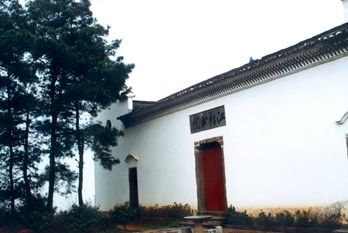 The culture of the academy
The culture of the academy